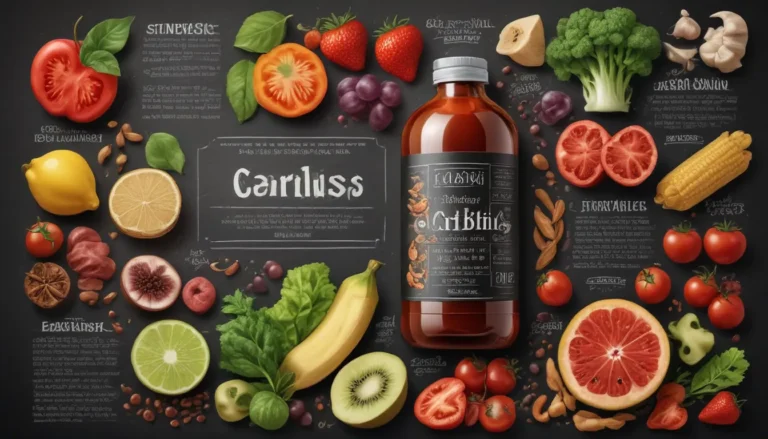The pictures in our articles might not always show exactly what the text is talking about. We use these images to make the article more interesting and eye-catching. They are there to add to the text, but not to replace it or show every detail.
Are you curious about the role of monosodium glutamate (MSG) in your diet? This flavor enhancer has sparked discussions and debates in the culinary world, but what are the real facts behind the myth? Let's dive into 10 essential MSG nutrition facts to shed light on its composition, potential impact on health, and dispel common misconceptions.
Understanding MSG: A Culinary Gem
MSG is a flavor enhancer that elevates the umami taste in various dishes. It is the sodium salt of glutamic acid, an amino acid naturally present in foods like tomatoes, mushrooms, and cheese. Adding MSG to your cooking can intensify flavors and make your meals more enjoyable.
Embracing Nature: MSG in its Pure Form
While glutamic acid is found in nature, MSG is a concentrated form that enhances flavors in processed foods. This synthetic extraction process allows for a potent boost in taste without compromising on quality.
Light on the Calories, Heavy on Flavor
If you're watching your calorie and fat intake, MSG is a great ally. It's low in calories and fat-free, offering a sodium content that is significantly lower than regular table salt. By using MSG, you can reduce your sodium intake while still savoring delicious dishes.
Busting the Allergy Myth: MSG Edition
Contrary to common belief, MSG is not a prevalent allergen. True allergies to MSG are rare, with only a small number of individuals experiencing symptoms like headaches or flushing after consuming high MSG foods. However, scientific evidence linking these symptoms to MSG remains inconclusive.
The Myth of MSG Sensitivity
Claims of MSG sensitivity or intolerance lack solid scientific grounding. While individual reactions may vary, studies have not consistently proven a direct link between MSG consumption and reported symptoms like headaches. In general, most people can safely enjoy MSG without adverse effects.
Safety First: Regulatory Approval
Rest assured, MSG is deemed safe for consumption by regulatory bodies worldwide, including the U.S. Food and Drug Administration (FDA) and the European Food Safety Authority (EFSA). It is classified as generally recognized as safe (GRAS) when used according to good manufacturing practices.
A Pinch of MSG: Moderation Matters
Like any food additive, moderation is key when using MSG. While generally safe, excessive consumption of MSG can lead to increased sodium intake. Be mindful of your overall sodium consumption and aim for a well-balanced diet.
Unveiling the Sodium Myth
MSG is often misunderstood as a sodium culprit, but in reality, it contains less sodium than table salt. Individuals looking to lower their sodium intake should be aware of their total sodium consumption, including both natural and added sources.
The Flavor Trail: MSG in Asian Cuisine
Asian cuisine has long embraced MSG for its ability to enhance flavors. From Chinese to Japanese and Korean dishes, MSG has become a staple ingredient that elevates the savory taste profile of traditional meals.
Exploring Flavor Horizons: Beyond MSG
While MSG is a popular flavor enhancer, there are plenty of alternatives to explore. Herbs, spices, and natural flavor enhancers like yeast extracts offer diverse flavor profiles that cater to individual tastes and preferences.
Unraveling the MSG Enigma: A Balanced Viewpoint
In conclusion, understanding the facts about MSG empowers you to make informed choices about its presence in your diet. With regulatory approval and minimal allergenic potential, MSG can be a safe and enjoyable addition to your culinary repertoire. Remember, moderation and a balanced diet are key to overall health and well-being.
Your Burning Questions Answered: Understanding MSG FAQs
Is MSG harmful to your health?
Scientific research and regulatory bodies have deemed MSG safe for consumption for most individuals. While some may experience mild symptoms, MSG is generally considered safe.
Can MSG cause headaches?
Whilst anecdotal reports exist, scientific studies have not conclusively proven a direct link between MSG consumption and headaches. If you suspect a connection, consult with a healthcare professional.
Can you avoid MSG in your diet?
While challenging, avoiding MSG is possible by cooking from scratch using fresh ingredients and minimizing processed food consumption.
Is there a difference between natural glutamic acid and added MSG?
Both forms are chemically identical, but added MSG has a higher concentration for enhanced flavor.
Can MSG be part of a balanced diet?
Absolutely, in moderation. Enjoy the flavor-enhancing benefits of MSG while keeping an eye on your overall sodium intake.
Wrapping Up with Quality Content
As we navigate the world of MSG, trust in the authenticity and accuracy of the information we provide. Each fact is contributed by real users like you, ensuring a wealth of diverse insights and credible information. Our editors meticulously review all submissions to maintain the highest standards of quality and authenticity. Explore, learn, and grow with us as we continue to deliver trustworthy and engaging content.
In conclusion, understanding the facts about MSG equips you with the knowledge to make informed decisions about your diet. Embrace flavor diversity and enrich your culinary experiences while prioritizing moderation and balance for a healthier life ahead.






